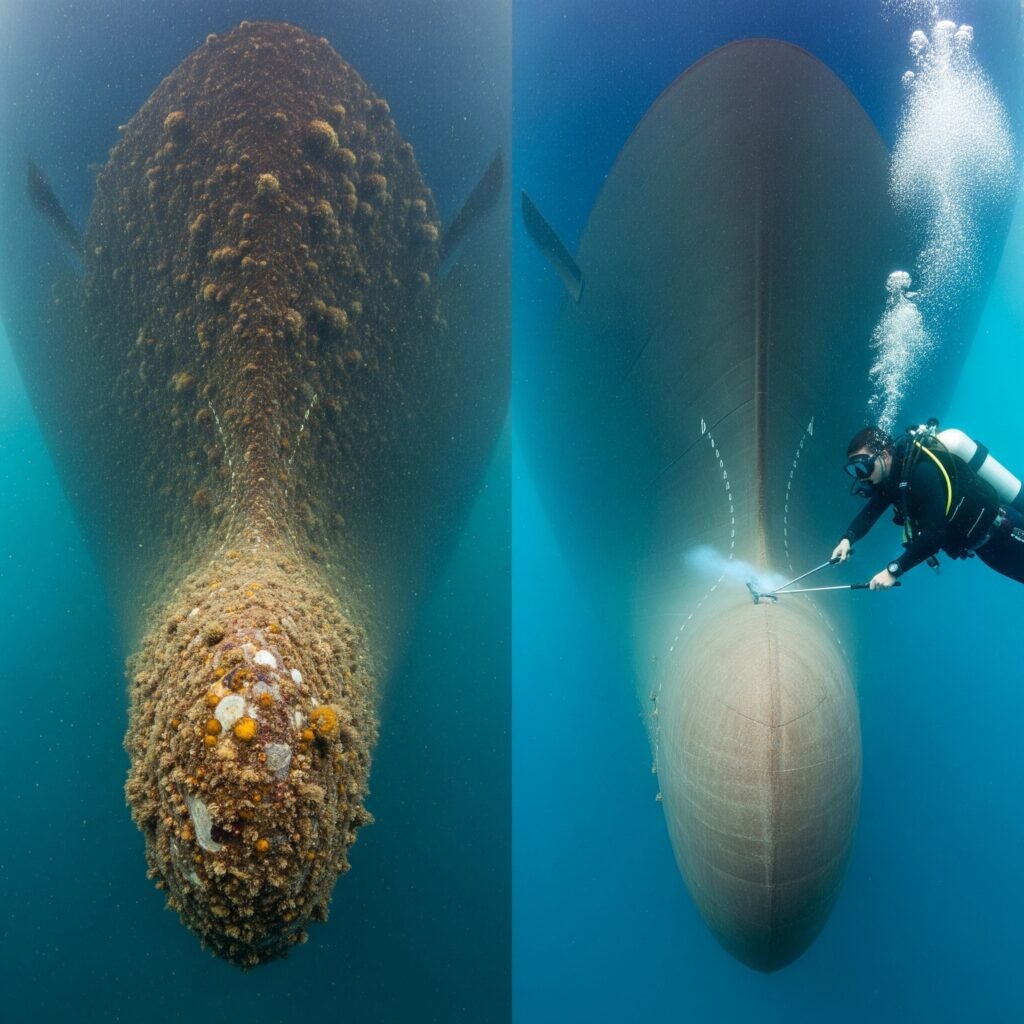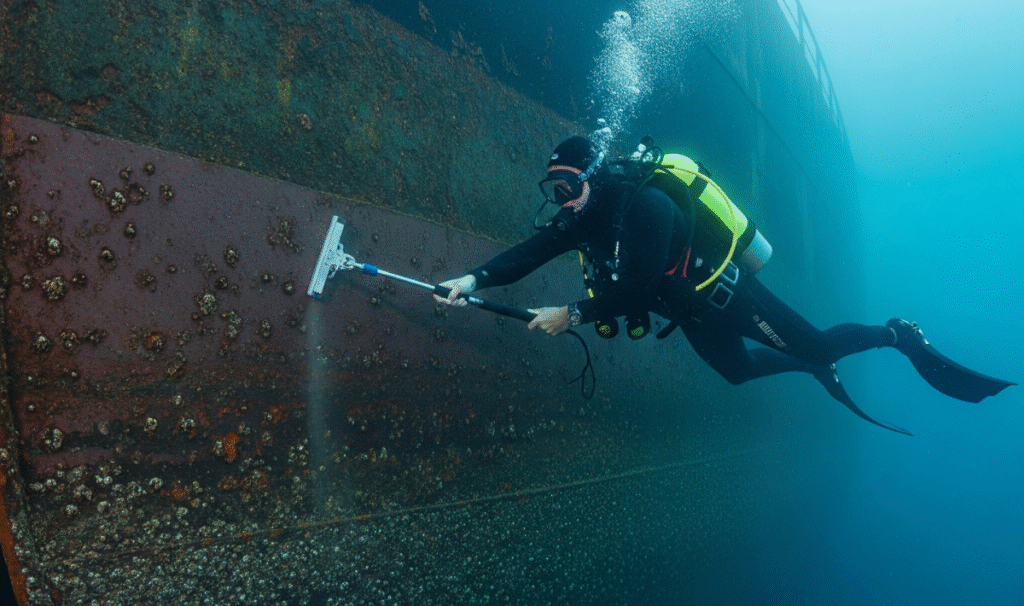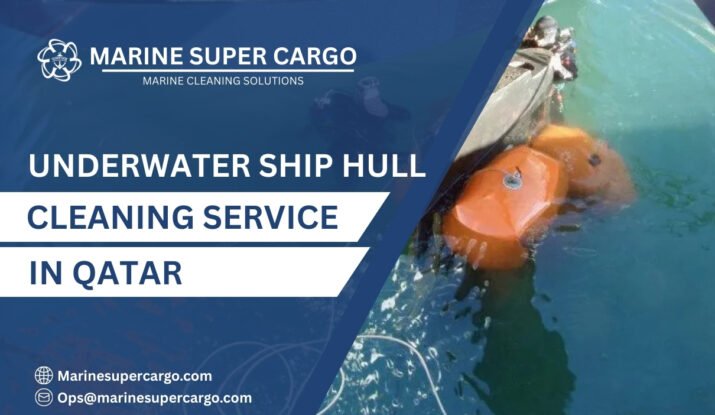Qatar isn’t just a global leader in energy exports—it’s also an emerging powerhouse in maritime trade. With its deep-water ports like Hamad Port and its strategic position on the Arabian Gulf, Qatar serves as a vital node connecting Asia, the Middle East, and Europe.
But every ship calling here faces a universal challenge: biofouling—the silent accumulation of algae, barnacles, and seaweed clinging to the hull below the waterline. This seemingly minor problem translates into major operational inefficiencies. Fortunately, underwater ship hull cleaning in Qatar offers an effective solution.
It may happen beneath the surface, hidden from view, but its impact is enormous—on efficiency, on vessel safety, and on the environment. Let’s explore the underwater ship hull cleaning in Qatar.
What is Underwater Ship Hull Cleaning in Qatar?
Think of a ship’s hull like a swimmer’s streamlined wetsuit. Smooth surfaces help them cut through the water effortlessly. Now imagine that wetsuit covered in sticky seaweed—it slows them down, making every stroke more frustrating.
That’s exactly what biofouling does to ships. Underwater ship hull cleaning in Qatar involves trained divers or robotic systems scrubbing, brushing, or using modern suction tools to remove fouling while protecting hull coatings. This isn’t just about shine—it’s about restoring performance and efficiency.
The Drag Impact of Biofouling
Barnacles and algae increase drag, forcing ships to burn far more fuel than necessary. In fact, studies show that biofouling can cause a vessel’s fuel consumption to rise by up to 40%. That’s like driving with your handbrake partially on—wasteful and costly.

Fuel Savings and Voyage Performance
With underwater ship hull cleaning in Qatar, resistance drops and ships regain their favorable hydrodynamics. The engines no longer need to overwork, which reduces fuel use, slashes operational costs, and shortens voyage durations. For vessels moving LNG, crude oil, or cargo through Qatar, the savings have a direct and measurable financial impact.
Preventing Corrosion and Hull Damage
A fouled hull isn’t just inefficient—it’s unsafe. Growth traps moisture, breaking down coatings and corroding steel. Over time, this weakens hull integrity and could jeopardize vessel safety.
Routine underwater ship hull cleaning in Qatar prevents fouling from escalating to this stage. By keeping hulls smooth and clean, operators extend vessel lifespans while avoiding costly repairs down the line.
Compliance with International Maritime Standards
Safety is tightly regulated in shipping. The International Maritime Organization (IMO) requires ships to maintain seaworthiness, and inspections extend below the waterline.
By adopting underwater ship hull cleaning in Qatar, ship operators ensure their vessels comply with safety checks, MARPOL’s anti-pollution requirements, and global standards. That means fewer delays, fewer penalties, and more seamless port operations.
Lowering Carbon Emissions Through Efficiency
Every ton of fuel burned means more emissions. Shipping already accounts for nearly 3% of total global greenhouse gases, according to imo.org. Hull cleaning offers an immediate mitigation pathway.
Through underwater ship hull cleaning in Qatar, fuel-saving translates into emissions reduction—supporting Qatar’s wider sustainability goals while protecting global air quality.
Preventing the Spread of Invasive Species
Fouling organisms can stow away across oceans, threatening ecosystems along the way. The MARPOL Convention emphasizes controlling these risks.
By implementing underwater ship hull cleaning in Qatar, operators minimize the risk of invasive species entering the Gulf, protecting its delicate marine habitats.
Strategic Gulf Location for Global Trade
At the crossroads of East and West, Qatar’s ports are natural pit stops for vessels on global trade routes. Scheduling underwater ship hull cleaning in Qatar while docking saves shipowners time and reduces costs associated with diversions elsewhere.
Modern Ports and Skilled Professionals
Qatar’s marine workforce, trained to standards similar to those outlined by imca-int.com and supported by global best practices from iaphworldports.org, ensures world-class underwater maintenance. Advanced facilities provide cutting-edge support to vessels of all sizes.
The Process of Underwater Hull Cleaning in Qatar
Step-by-Step Approach
- Inspection – Divers or remotely operated vehicles (ROVs) assess fouling extent.
- Cleaning Phase – Biofouling removed with brushes, scrapers, or suction tools.
- Polishing – Surfaces smoothed to restore efficiency.
- Waste Management – Captured organisms are disposed of responsibly.
- Final Report – Compliance and performance improvements recorded.
Tools and Technologies Used Locally
Underwater ship hull cleaning in Qatar increasingly leverages robotic machines, suction-based filtration, and protective brushes to ensure minimal coating damage and environmental responsibility.
Fouling in Warm Gulf Seas
Qatar’s warm, nutrient-rich waters speed up fouling. Ships docked for extended periods accumulate thick growth, making underwater ship hull cleaning in Qatar even more critical compared to colder climates.
Balancing Frequency and Costs
Clean too often, and you risk premature coating wear. Wait too long, and fouling skyrockets fuel use. Experts recommend scheduling every 6–12 months, depending on vessel activity and operating conditions in the Gulf.

Eco-Friendly Cleaning Innovations
The future points toward green cleaning: antifouling paints free of harmful chemicals, suction systems that block residue release, and even ultrasonic cleaning. Qatar, with its emphasis on sustainable development, is primed to adopt these innovations.
AI, Robotics, and Predictive Maintenance
Imagine sensors continuously monitoring hull smoothness and sending real-time data to maintenance crews. Soon, AI algorithms will predict fouling buildup while autonomous robots carry out underwater ship hull cleaning in Qatar, making the process faster, safer, and more precise.
Conclusion
Hull cleaning may happen quietly beneath the waves, but its impacts are unmistakable—fuel savings, vessel safety, and environmental responsibility. The three key benefits of underwater ship hull cleaning in Qatar include:
- Fuel efficiency and cost reduction by minimizing drag.
- Improved safety and extended vessel lifespan through corrosion prevention and compliance.
- Environmental protection, cutting emissions, and preventing invasive species transfer.
For ships passing through Qatar’s strategic ports, regular hull cleaning is more than necessary—it’s a smart, future-ready investment. Partnering with experts like CleanShip.co ensures efficiency, sustainability, and long-term success.
FAQ:
Q1. How often should underwater hull cleaning be scheduled in Qatar?
Generally, every 6–12 months, though warm Gulf waters may require more frequent servicing.
Q2. Does cleaning damage protective coatings?
Not with today’s eco-sensitive methods, which prioritize protecting vessel coatings.
Q3. How does hull cleaning reduce carbon emissions?
By lowering drag, ships consume less fuel, cutting greenhouse gases significantly.
Q4. Why is Qatar a strong hub for ship maintenance?
Its strategic trade location, modern ports, and skilled marine professionals make underwater ship hull cleaning in Qatar highly practical.
Q5. Can hull cleaning control invasive species?
Yes, removing marine growth prevents non-native organisms from entering Qatar’s sensitive marine habitats.


